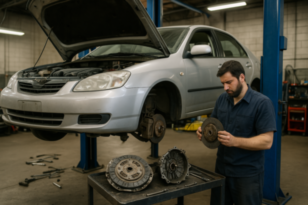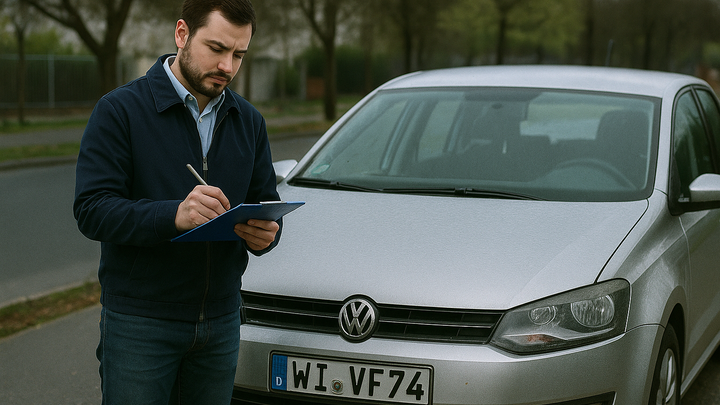Faulty clutch: What to do now – symptoms, causes, repair costs
When the clutch goes on strike: How to find the cause and the right solution
The clutch is one of the typical wearing parts in a car. It connects the engine and transmission and allows you to control the transmission of power when changing gear. But what happens if the clutch is faulty? What symptoms indicate damage – and when is a repair no longer worthwhile?
In this article, we show you how to recognize signs early on, what the common causes are and what repair costs you can expect.
Signs: How to recognize clutch damage
If the clutch is no longer working properly, this is usually quickly noticeable. Depending on the severity of the wear, the driving behavior changes significantly – especially when shifting gears and accelerating.
Typical signs:
- Engine speed increases, but hardly any propulsion: The clutch slips and does not transmit the power completely.
- Sluggish gear changes: Gears can only be engaged with force or are jarring.
- Unfamiliar pedal feel: The clutch pedal is soft, hard or has an unusual idle travel.
- Noises when clutching: Grinding, squeaking or cracking noises indicate mechanical problems.
- Burnt smell: Overheating can lead to a typical odor, especially after heavy starting.
You should take these warning signals seriously – because if you wait too long, you risk consequential damage to the gearbox or flywheel.
Causes: Why the clutch fails
Clutches wear out over time – that's normal. However, there are factors that can significantly shorten the service life:
- Grinding starts (e.g. on inclines or in city traffic)
- Continuous load due to trailer operation
- A lot of stop-and-go driving in rush-hour traffic
- Excessive clutch use when idling or at traffic lights
- Leaking oil in the clutch area, which renders the friction linings unusable
In rare cases, the clutch can also fail suddenly – for example due to material breakage, defective hydraulic cylinders or a blocked release bearing.
Clutch broken – can you still drive?
The short answer: only to a limited extent – and only for short distances. At the first symptoms, such as a slipping clutch or delayed clutch engagement, it may still be possible to drive to the workshop. However, the damage can worsen with every kilometer. The friction linings continue to wear down, the flywheel can overheat and, in the worst case, the vehicle suddenly stalls – for example when starting off on an incline or on the highway.
A defective clutch also makes safety-relevant situations such as overtaking or starting off on a hill critical. Therefore, if you notice any unusual behavior, don't wait and see, but take action.
Costs: What it really costs to replace a clutch
The repair costs depend on the type of vehicle, the design of the clutch and the amount of work involved. Modern vehicles often have more complex systems that are more expensive to maintain.
Typical price ranges:
- Clutch replacement (disk & pressure plate only): 600 – 1,000 €
- Clutch + dual mass flywheel: 1,200 – 2,000 €
- New clutch lining (if possible): 400 – 600 €
The biggest cost drivers here are the working time (often over 6 hours) and additional parts such as the flywheel or release bearing, which should also be replaced during the repair.
Technology fact:
Modern clutches consist of several precisely matched components: Friction disk, pressure plate, release bearing and often a dual-mass flywheel. In addition, hydraulic or electronic control systems are used in many vehicles. Replacement is therefore technically demanding – and costly, especially in automatic transmissions or dual clutch systems.
Special features of automatic transmissions
There are also clutch elements in automatic cars – especially in dual-clutch transmissions (DSG, S-Tronic etc.). These work automatically and also wear out over time.
Typical signs:
- Delayed starting
- Jerking when changing gear
- Speed fluctuations without acceleration
- Error messages or warning lights
A repair here requires special diagnostic equipment and trained specialists. The costs are usually significantly higher than those of conventional clutch systems.
New clutch slipping – what could be the cause?
If the clutch does not function properly after replacement, the cause is usually an installation error or previous damage that has not been rectified. Possible reasons:
- Leaks in the transmission (oil contaminates the new friction disk)
- Incorrect installation of the release bearing or guide sleeve
- Incorrectly adjusted mechanics or hydraulics
- Too much load too early during the running-in period
In such cases, the workshop should be contacted immediately. As a rule, you are entitled to a repair.
If the repair is no longer worthwhile – sell instead of investing
With older vehicles, replacing the clutch can be economically questionable. If other repairs are also required – such as TÜV defects, rust or engine damage – the residual value of the vehicle is quickly exceeded.
Instead of investing several thousand euros in a repair, it is worth objectively assessing the market value of the car and thinking about selling it – especially if the car is hardly used anyway or a change of vehicle is planned.
Selling a vehicle with clutch damage – easy with CashforCars.de
CashforCars.de specializes in buying vehicles in any condition – even with clutch damage, transmission problems or other technical defects.
Your advantages at a glance:
- Fair offers – even for defective cars
- Fast online valuation
- Collection free of charge nationwide
- We can take care of deregistration on request
- Direct payout via real-time bank transfer
This is how you can have your car valued:
- Online: Conveniently enter your vehicle details using the online form on CashforCars.de
- By phone: Call us on +49 (211) 7306 1701
- By WhatsApp: Send us a WhatsApp message with the vehicle data – we'll get back to you quickly
Conclusion: Clutch defective? Decide wisely now
A defective clutch cannot be ignored – the symptoms are clear and the repair is usually expensive. If you react in time, you can avoid consequential damage and limit the costs. In some cases, however, selling the vehicle is the more economical option.
CashforCars.de offers you a simple, quick solution – regardless of the vehicle's condition.
Start a free valuation now and find out whether selling is more worthwhile than the next repair.






